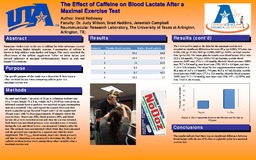
ATTENTION: The works hosted here are being migrated to a new repository that will consolidate resources, improve discoverability, and better show UTA's research impact on the global community. We will update authors as the migration progresses. Please see MavMatrix for more information.
Show simple item record
| dc.contributor.author | Holloway, Heidi | en_US |
| dc.date.accessioned | 2012-02-14T18:55:12Z | en_US |
| dc.date.available | 2012-02-14T18:55:12Z | en_US |
| dc.date.issued | 2012-02-14 | en_US |
| dc.identifier.uri | http://hdl.handle.net/10106/9293 | en_US |
| dc.description.abstract | Numerous studies exist on the use of caffeine for both endurance exercise and short-term, higher intensity exercise. Consumption of caffeine is known to help athletes train harder and longer. This study examined the effectiveness of the caffeine supplement NoDoz on blood lactate and selected indicators of maximal cardiorespiratory fitness in male and female UTA students. | en_US |
| dc.description.sponsorship | Wilson, Judy, Ph.D. | en_US |
| dc.description.sponsorship | Campbell, Jeremiah | en_US |
| dc.description.sponsorship | Heddins, Brad | en_US |
| dc.language.iso | en_US | en_US |
| dc.subject | Caffeine | en_US |
| dc.subject | Blood lactate | en_US |
| dc.subject | Maximal exercise test | en_US |
| dc.subject | NoDoz | en_US |
| dc.title | The effect of caffeine on blood lactate after a maximal exercise test. | en_US |
| dc.type | Presentation | en_US |
| dc.publisher.department | Neuromuscular Research Laboratory, University of Texas at Arlington. | en_US |
| dc.publisher.department | Exercise Science Research Laboratories, University of Texas at Arlington. | en_US |
Files in this item
- Name:
- holloway poster My Research[1].pdf
- Size:
- 1015.Kb
- Format:
- PDF
- Description:
- PDF
This item appears in the following Collection(s)
Show simple item record


